Software developers and engineers alike dedicate time to designing projects to get them right. However, any project implementation is going to have unforeseen challenges and issues. Challenges are always around. However, a good measure of resiliency for any project, business model, or organization is not how well it handles things when everything is planned but when speed bumps come along.
An issue or bug tracker is a critical tool for software development and project management workflows. An issue tracker allows developers to open, track, and resolve bugs collaboratively while making it easy to track the progress. Bug trackers encompass many options focused on meeting specific needs, features, and use cases, including but not limited to software development or project management.
Top opensource bug and issue tracking tools for Linux
The article reviews some top open source systems and tools for managing bugs and issues. There are many open source issue tracking alternatives. However, our list includes ten of the best issue trackers based on features, how easy it is to host them in your system, and the community’s vibrancy in developing the project. There are also cloud-hosted versions of issue tracking tools like JIRA, GitHub Issues, and Launchpad that favor the open-source community.
1. Mantis BT
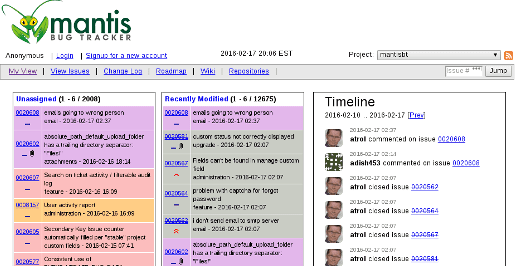
mantis issue tracker
Mantis BT is a free, open-source bug tracking software. It is PHP-based with support for many revision control systems and an event-driven notification system. While it does not contain a wiki, it integrates with many popular wiki platforms. You can use it to track bugs for various software projects. You can easily download and install the Mantis for your use. Moreover, it is also available as hosted software.
Features
- It features updates, comments, and resolutions email notifications.
- It features advanced access control to control user access at the project level.
- It supports customization as per your requirements.
- It includes support for iPhone, Android, and Windows Phone Platforms.
- Its community provides an extensive library of plugins to add custom functionality.
- It is multilingual.
Mantis is released under the GPL version 2 license; you can check out its source code on GitHub or the self-hosted roadmap for its upcoming releases and project plans.
2. Bugzilla
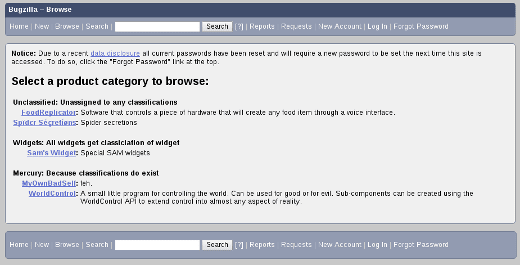
Bugzilla bug tracker
Bugzilla is a popular open-source development tool with advanced issue tracking capabilities. It was created by the Mozilla Foundation to track bugs in the development of its initial projects like the Netscape Communicator suite and currently the Firefox web browser. It is one of the oldest and most widely adopted issue tracking systems. The current version has been ported to Perl from its original Tcl routes for greater accessibility. Bugzilla is favored by large open-source projects like the Linux kernel, GNOME, and KDE.
Features
- It includes advanced search capabilities, including a Google-like bug an advanced search system to create custom time-based searches and other specific queries.
- Custom email notifications are defined by user preferences, including any changes made in Bugzilla.
It can display bug lists in multiple formats, including HTML, Atom feeds, iCalendar if you are using time-tracking features, long printable reports, CSV, XML, etc. - It includes flexible reporting and charting that allows you to schedule daily, weekly, and hourly reports that you can receive via email.
- Its advanced reporting system allows you to use several search criteria or view database tables as bar graphs, line graphs, or pie charts.
- You can export reports as CSV to work with spreadsheets.
- It includes a charting system that can create graphs that track system changes over time.
- It supports automatic duplicate bug detection. It allows users to add themselves to the CC list of the duplicate bug instead of filing a new one.
- You can send Bugzilla an email to modify or file new bugs.
- It includes bug time tracking to estimate the time a bug will take to fix or the time spent working on it.
- It features a flexible request system that allows you to ask a team member to work on a particular bug, ask for a code review, request information from a specific user, get a sign-off from a supervisor, and many more.
- It supports private attachments and comments if you are an “insider” in the team.
- It includes the patch viewer that gives users a colorful view of any patch attached to a bug. It makes code review much more effortless.
- You can “watch” other users by getting every email that user gets from Bugzilla. It is useful when one developer goes on vacation, and another needs to handle the developers’ bugs.
- It allows you to move bugs from one Bugzilla to another between installations or versions, like from Bugzilla 2.16 installation to a Bugzilla 3.0 installation.
Bugzilla is licensed under the Mozilla Public License, and you can read their future roadmap and try out a demo server on the official website.
3. Redmine
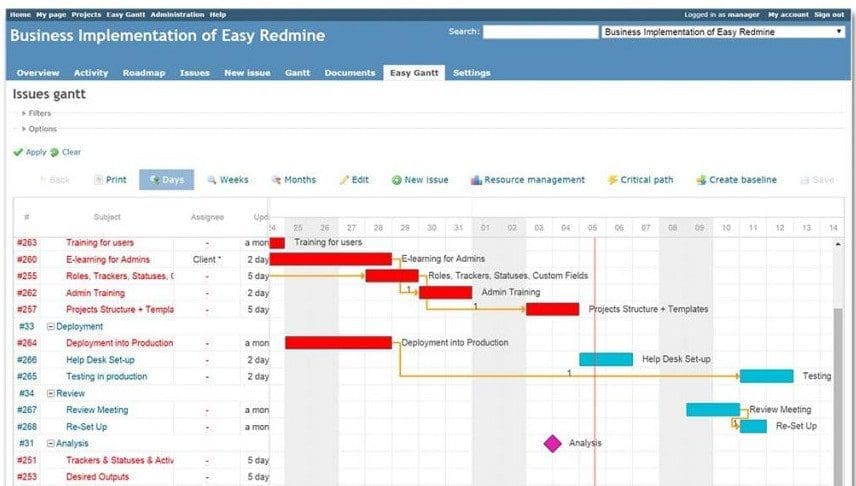
Redmine
Redmine is an open source issue tracking tool built on Ruby on Rails. The project was initiated in 2006 and is similar in functionality to Trac. It is popular among its community and is capable of managing multiple projects. What you will like about Redmine is that it also offers wikis, forums, time tracking tools, and the ability to generate Gantt charts and calendars to track the progress of your projects. It is well-suited to scrum and agile workflows.
Features
- It is a lightweight project management tool with issue tracking capabilities.
- It integrates well with several version control systems.
- It supports wikis, Gantt charts, calendars, and file/document storage.
- It provides flexible role-based access control to define your roles and set permissions.
- You can manage all your projects with one Redmine instance.
- It offers flexible hosting options; host it yourself on your web server for free or pay to have it hosted as a software-as-a-service.
- It supports extensive customization. You can add custom fields to issues, projects, users, etc.
- It includes advanced documents, news, and file management to share files easily.
- It includes a repository browser and diff viewer to attach existing repositories to your projects.
- It supports email notifications and Atom feeds for project activity, news, issues, changesets, and issue changes.
- It includes multiple LDAP authentication.
- It is pretty straightforward to set up.
- It supports multiple database backends like MySQL, PostgreSQL, and SQLite.
- You can extend its functionality with many community-created plugins and themes.
- It is multilingual.
Redmine is licensed under the GPL version 2. Check out its source code in the project’s subversion repository or mirrored on GitHub.
4. Trac
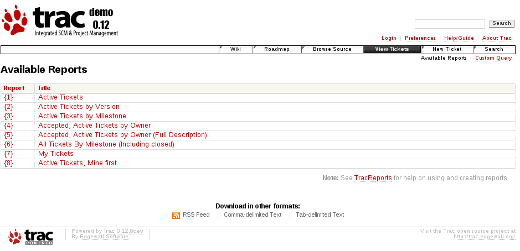
Trac Issue tracker
Trac takes a minimalistic approach to web-based software project management. But this does not signify that its minimalism approach lacks features. Trac is written in Python. It integrates its bug tracking capabilities with a revision control system of your choosing and its wiki.
Features
- It features project management capabilities like generating milestones and roadmaps.
- It includes a customizable reporting system.
- It supports advanced timelines features.
- It includes support for multiple repositories.
- Its security features include a built-in spam filter.
- It supports plugins to extend its functionality set even further.
- It is multilingual.
Trac is currently is available as open-source under a modified BSD license. You can check out Trac’s source in a self-hosted repository and roadmap from the project team for future release plans.
5. OTRS
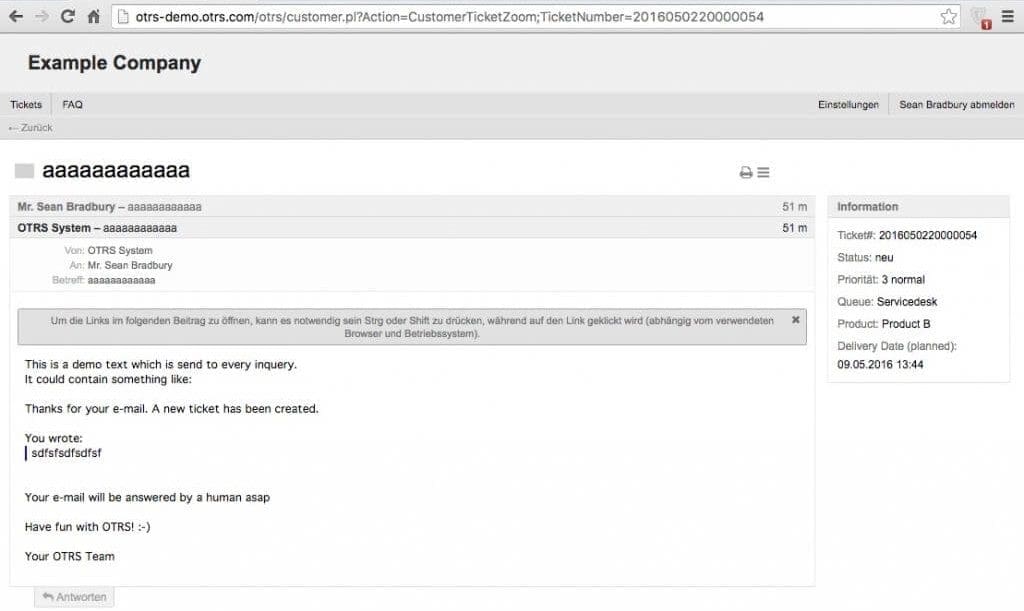
otrs ticketing system
OTRS (Open-source Ticket Request System) is a modern, free, open-source ticketing and process management system. It is written in PERL, and its initial release was in 2001. You can use it as a ticketing system, bug tracker, or customer service solution. OTRS allows professionals to manage the lightning-fast, results-driven business environment regardless of industry.
Features
- It includes service management tools for the automation of tickets and processes.
- It includes templates, assignments, and complete request histories. It helps you to avoid errors and complete tasks quickly.
- It supports fast access to information and reporting to ensure efficient, timely, and adaptable responses and reactions.
- It allows individualization through layout adjustments, themes, and workspace personalization.
- It includes a personal organizer for each agent to generate, save and manage search results and lists.
- It supports the live view of agents working in a ticket with real-time updates without reloading.
- It supports advanced security features such as two-factor authentication and end-to-end encryption.
- It includes scheduled reports on the current customer situation or performance.
- It provides multichannel communication via social media, live chat, email, SMS, and telephone.
- It features advanced time management of time and SLAs.
- It supports automation and processes to create daily work routines, establish and digitize workflows.
FUN FACT:
Life is full of bugs.
6. Eventum
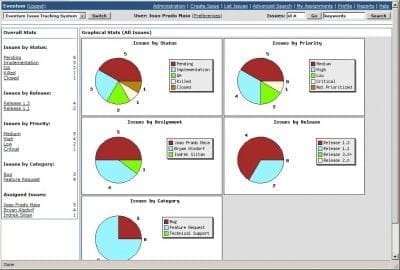
Eventum
Eventum was written in PHP by the MySQL development team. You can use it as a bug tracking tool or issue tracking system. It provides all the essential features you might expect in a tracking system. A support department can track incoming technical support requests, while a software development team can use it to organize tasks and bugs. It is available under an open-source license.
Features
- You can assign users roles and projects with desired levels of access, including but not limited to Administrator, Viewer, Customer, Developer, Manager, or Standard user.
- It includes email integration to send and receive emails from Eventum.
- It allows you to set up queuing and granular preferences for each user for email updates, routing, and tracking.
- It includes an advanced reporting system.
- It supports full-text search where you can search issues using MySQL FULLTEXT support.
- It provides an advanced email routing interface.
- It supports RSS feeds.
7. Request Tracker
Request tracker
RTIR (Request Tracker for Incident Response) builds on all the features of RT. It includes pre-configured workflows and queues designed for incident response teams. It is an essential tool for many CERT and CSIRT teams and communities.
Features
- You can integrate it with LDAP authentication.
- It supports time tracking and reporting.
- It features seamless email integration to manage all emails sent to your key email addresses.
- The latest version RT 5.0, features a new modern and responsive layout.
- It provides a graphical life cycle creator to create, automate, and manage workflows.
- It supports automation via actions and scrips.
- It features an elegant updated charting interface and dashboard.
- It supports asset management to track and manage equipment you are responsible for in RT.
- You can integrate it with authentication systems like Active Directory, SAML, etc.
- It supports the customization of dashboards with key ticket information.
- It supports automatic notifications based on tickets and messages.
- It includes General Data Protection Regulation (GDPR) support.
- It features a command-line interface.
- It supports over 400 free extensions to add features and functionality.
- It is multilingual.
8. Pachno (formerly The Bug Genie)
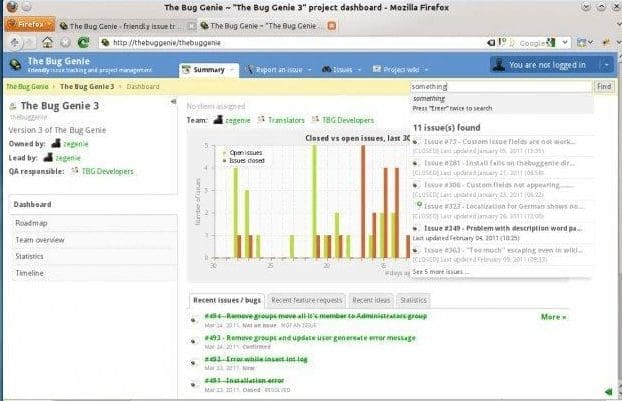
Pachno- (Formerly The Bug Genie)
Pachno (formerly the Bug Genie) is an open-source issue tracking tool written in PHP. It provides wizard-based bug tracking software. You can use it as a collaboration platform for teams of all sizes and locations. It can help you bring your team together through your projects’ design, building, and delivery phases. It is a tool that works and adapts to your project’s needs.
Features
- It integrates the OpenSearch functionality.
- It features advanced issue-tracking, including custom data and fields.
- It includes support for multiple teams and clients, i.e., a team of one or many teams.
- It supports user and task time tracking with visualization of time spent.
- It includes planning boards with kanban, agile, and scrum features.
- You can integrate it with Subversion.
- It includes a feature-rich documentation editor.
- It is an extensible platform to develop custom modules and extend functionality.
- It is multilingual.
9. Fossil
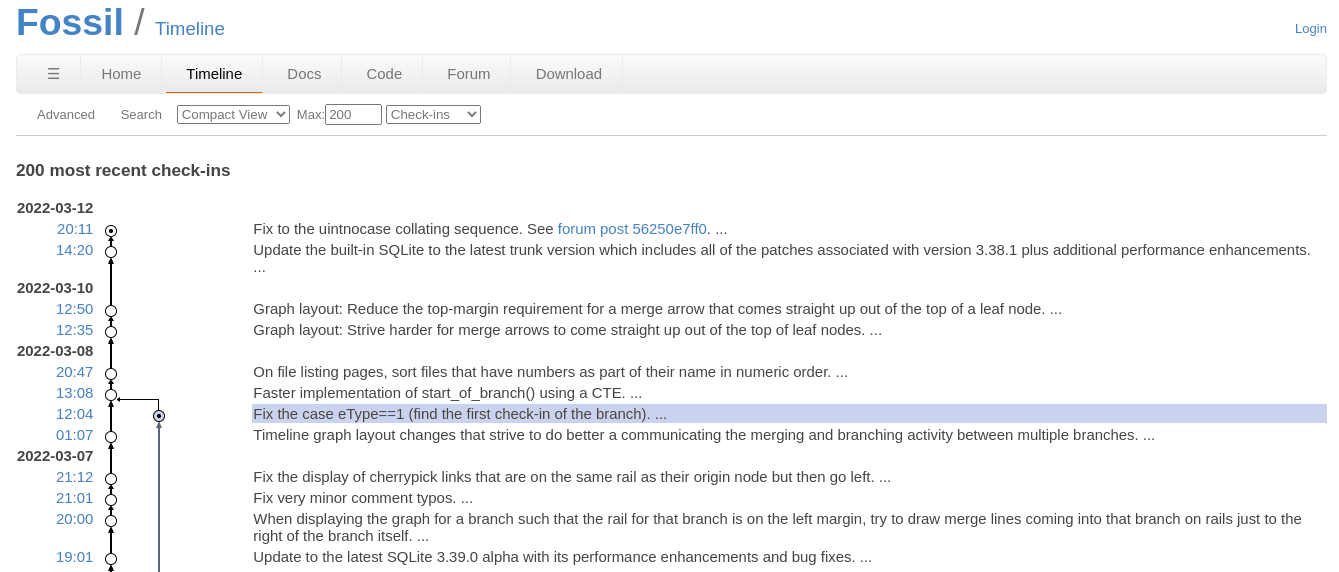
fossil issue tracker
Fossil is a simple-to-use, high-reliability, open source issue tracking and distributed software configuration management system. It is written in C, and its key components include a distributed version control system, a bug tracker, a wiki, and other project management features.
Features
- Installation is very straightforward, with a single executable file that contains everything you need to get fossil up and running.
- It includes a built-in, extensible, themeable, and intuitive web interface.
- It features simple networking (HTTPS or SSH ) for network communications which should work fine behind proxies and firewalls.
- It supports an auto-sync mode to keep projects moving forward by eliminating needless forking and merging in distributed projects.
- It is a robust and reliable system that allows you to store content using an enduring file format in an SQLite database to enable atomic transactions.
- It allows automatic self-checks to verify all aspects of the repository are consistent before each commit.
10. Webissues
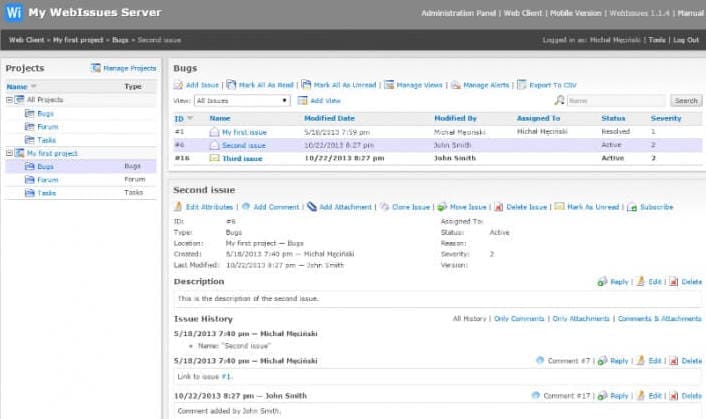
webissues issue tracker
Webissues is an open-source, multi-platform system for issue tracking and team collaboration. It is written in PHP and uses the MySQL database for the server-side. Most of our list consists of web-based bug tracking tools except for WebIssues. However, it doesn’t provide a web-based interface. You need a webissues client that runs on Linux or Windows to access the server component for it to work. You will like it for its ease of transparency and collaboration with your team.
Features
- It is a simple server-based issue tracking and group joint effort framework for end clients.
- You can use it to store, share and track issues with various descriptions, attributes, comments, and file attachments.
- It supports notifications, sending, and receiving emails.
- It supports creating reports and data export.
- It provides filtering and searching issues functionality.
- You can track new and modified issues.
- It is highly customizable.
Wrapping up
Life is full of bugs, but nothing tops the joy of finding bugs and issues to keep your project stable and reliable for users and clients. Our list includes some of the best free, open-source bug tracking tools. The tools include reliable and intuitive bug tracking tools with project management features to support your team.
What is your favorite bug tracking tool? Share by leaving a comment.
